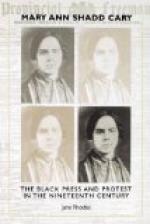But isn’t it strange, when the time comes for you to do a thing you are crazy to do, you wish it hadn’t come?
There have been days when I hated this Asylum. I’ve felt at times that I was just one of the numbers of the multiplication table, and in all my life I’d never be anything else. And I’d almost sweep the bricks up out of the yard, I’d be so mad to think I was nothing and nobody.
I wanted to be something and somebody. I didn’t want to die and be forgotten. I would have liked to sit on St. John’s Church steeple and have everybody look at me and say:
“That’s Mary Cary! She’s great and rich, and gives away lots of money and sings like an angel.” That’s what I once would have liked, but I’ve learned a few things since I didn’t know then.
One is that high places are lonely and hard and uncomfortable, and people who have sat on them have sometimes wished they didn’t. Miss Katherine told me that herself, also that the place you’re in is pretty near what you’re fitted to fill. Otherwise you’d get out and fill another.
I’ve given up steeples and superiorities. But I’m glad I’m not going to be an orphan, just an orphan, all my life. I’m glad; still, when I think of going away and leaving everybody and everything: the old pump, where I drowned my first little chicken washing it; and the old mulberry-tree, where my first doll was buried; and the garret, where I made up ghost-stories for the girls on rainy days; and the school-room; and even No. 4—when I think of these things, I could be like that man in the Bible (I believe it was David, but it might have been Jonah), I could lift up my voice and weep.
But I’m not going to. Weepers are a nuisance.
I guess that’s the way with life, though. When things are going, you try to hold them back. And if you got them, you’d maybe wish you hadn’t.
That’s the way Mrs. Gaines did when her husband died. I mean when he didn’t die that first time. She thought he was going to, and so did everybody else. He had Fright’s disease, and it affected his heart, being liable to take him off any time, and Mrs. Gaines just carried on terrible.
She had faintings and hysterics, and said she couldn’t live without him, though everybody in Yorkburg knew she could, and easy enough. He without her, too, had she gone first. She had asthma and an outbreaking temper, and he drank.
Mrs. Mosby—she’s the doctor’s wife—said she didn’t blame him. No man could stand Mrs. Gaines all the time without something to help, and everybody hoped when he got so ill that he’d die and have a little rest. But he didn’t. He got better.
Mrs. Gaines was so surprised she was downright disagreeable about it, and how he stood it was a wonder. He didn’t long, for the next summer he was dead sure enough, and Mrs. Gaines put on the longest crepe veil ever seen in the South, she said. It touched the hem of her skirt in front and behind; but she cut it in half after everybody had seen it often enough to know how long it was.




